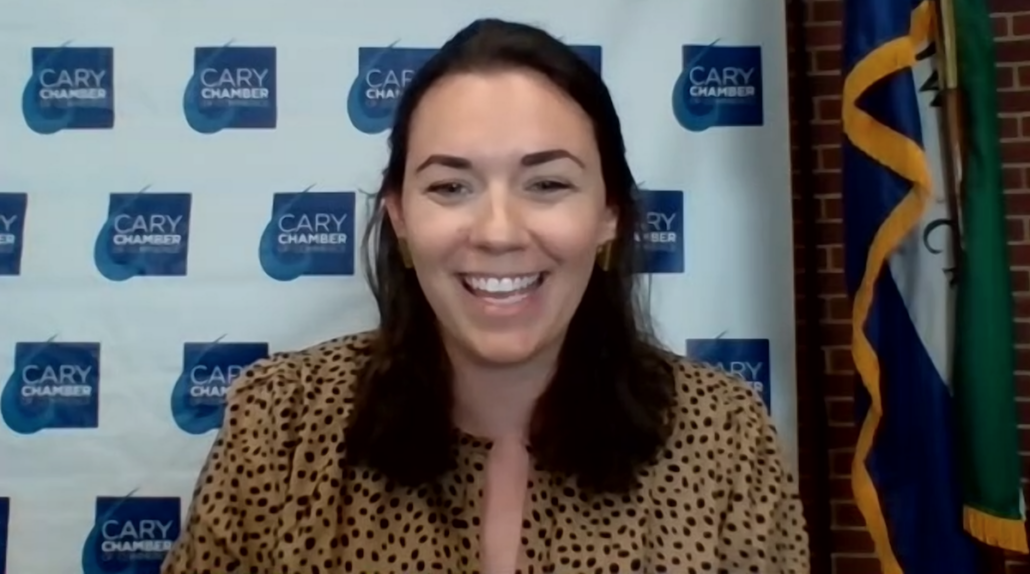Updates & Answers from Wake County Schools
Cary, NC — “We’re building an airplane while we’re flying it and going through turbulence at the same time.”
This sentiment came from Wake County School Board Member Bill Fletcher, while describing the impacts of the pandemic on Wake County Schools. He was speaking to a virtual audience alongside Northwestern Area Superintendent for Wake County Public Schools, Seydric Williams in a Cary Chamber hosted update on education.
Instead of a presentation-style meeting, Fletcher and Williams went a different route, answering direct questions from the Cary community.

From left, Northwestern Area Superintendent for Wake County Public Schools, Seydric Williams and Bill Fletcher, Wake County Board of Education Member.
What’s happening with device distribution?
With a rise in need for each child to have a device to take part in virtual learning, Williams said roughly 50,000 requests came in for Chromebooks alone with over 13,000 requests for hotspots in Wake County.
Fletcher added that 40,000 devices were initially ordered and an additional 80,000 have been ordered since, but none of them have yet to be delivered.
“Imagine there are 14,000 school districts around the country. All of them have needed to augment their technology support for students in some way, so the demand being placed on supply chains is absolutely astounding and our people are doing everything they can to get devices into students’ hands,” said Fletcher.
What if a teacher tests positive?
“The exact logistics of dealing with a teacher who tests positive I don’t know that I can share, but I’m absolutely certain they’ve been worked out to be both respectful of the teacher and of his or her charges in the classroom,” said Fletcher.
Williams added that teachers who become COVID-19 positive or need to self-quarantine may be able to continue work from home virtually. “If it is a situation where the teacher is not able to work, we do have substitute teachers,” said Williams.
While some substitute teachers have existing skills to teach virtually, Williams says the school system is also offering training opportunities to make sure all substitutes are comfortable navigating this new way of learning.

Perry Price, Director of Education & Government Relations with The Cary Chamber.
Will student performance testing change?
Moderator of the event, Perry Price posed a question on how the future may look different for testing. This question was answered in two ways — the day-to-day subject testing methods and also the larger picture of how to test student progress on ability level for their fitness for each grade level.
Fletcher started by saying tests will have to be looked at differently moving forward, and this might mean the phasing out of bubble-in test sheets and troubleshooting how to give tests virtually without kids using Google and opened books.
“I think we’re going to see more movement to more valid demonstrations of mastery at each level,” said Fletcher.
To the bigger-picture degree, there’s a question of on what grounds schools will assign students to particular grade levels — whether based on age group or ability level — following this highly unusual time where kids are learning at different paces.
On this, Williams said, “We do have situations where we want to bring in diagnostic tests to gauge where our students are and go it from there.” Moving forward, Williams is wanting to see regular progress monitoring.
How has funding affected decisions?
Wake County Schools has applied for a portion of the federal funds allocated to North Carolina and to Wake County government. With or without these particular funds, budget shortfalls were an issue for school systems in NC long before COVID-19.
“If the state compensation for teachers was sufficient we wouldn’t see 110 of 114 school districts in North Carolina having to have supplements to their salary schedules. The legislature is not providing the compensation that our professional teachers need and deserve,” said Fletcher. “If we’re going to provide high quality services to all of our children, how do we do that if we have a state budget that thinks the maximum a teacher should ever earn is $50,000? Even for a 30-year career teacher with a master’s degree.”
In addition to lower than ideal compensation, Fletcher says the NC Education Lottery has not put even one dollar into the operation of Wake County Schools. Instead, it finds its way to a general fund, mixed with other revenues with most of it going to the state treasury.
With more than 85% of Wake County School’s total budget going to personnel costs, Fletcher says the district needs the state to pay professional salaries to their teachers and provide additional positions for counseling staff, social workers and nurses.
What will cleaning protocols look like?
Wake County Schools has 21 million square feet of indoor instructional space to keep clean before, during and after the students are in the building. The dollar signs were mentally adding up as the panelists went into the logistics of how many hand sanitizing stations and how many extra personnel it would take to maintain these practices.
In a nutshell, Fletcher said, “The additional expense that we will have when we bring kids back into school is significant,” and Williams ended by saying, “All of this requires man and woman power and funding to make it all happen.”
Story and photos by Ashley Kairis.
All the Cary news every day since 2009. Subscribe by email.




“Fletcher says the NC Education Lottery has not put even one dollar into the operation of Wake County Schools. Instead, it finds its way to a general fund, mixed with other revenues with most of it going to the state treasury.”
Wouldn’t that make advertising it as the “NC Education Lottery” on TV and at ticket sales points fraud?
Also, related to the ‘cleaning protocols’, many of the Wake County schools are on a single shared HVAC system. There’s no way a typical HVAC filter can deal with something as small as a virus. So are arrangements being taken to install N95 level protection filters on classroom air returns?
“Wouldn’t that make advertising it as the “NC Education Lottery” on TV and at ticket sales points fraud?”
You would think that…but that hasn’t been the case since 2007. From the History section of the NCEL site:
“Originally, 35 percent of lottery proceeds were required to go to education. In 2007, the legislature changed this requirement to a guideline. There is no legislation safeguarding lottery funds for strictly educational purposes. Today, less than 30 percent of lottery revenue is allocated to education spending.”